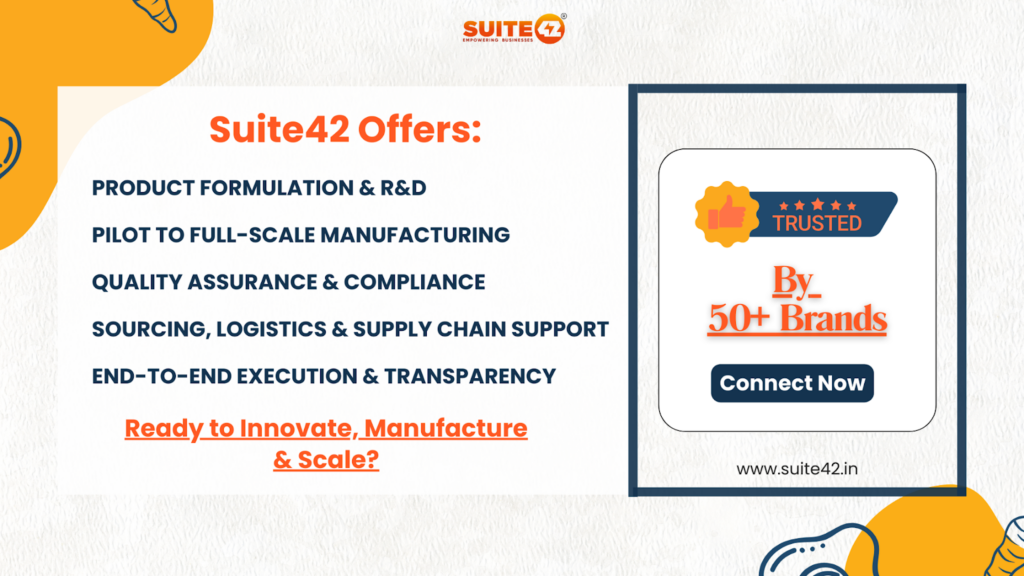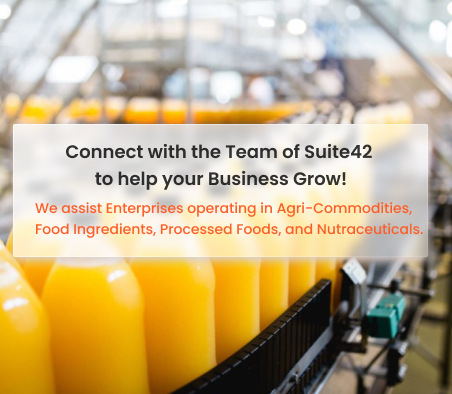Introduction
The Indian beverage landscape is undergoing a transformation as consumers increasingly gravitate toward products that combine taste, health, and convenience. Within this dynamic environment, flavoured milk formulations in India stands out as a rapidly evolving opportunity, drawing attention from both legacy dairy brands and emerging innovators. While protein shakes and meal replacement drinks capture the performance-focused segment, flavoured milks appeal broadly, merging indulgence with nutrition in a culturally resonant way.
Rising urbanization, increased disposable incomes, and a heightened focus on preventive health are encouraging consumers to seek beverages that go beyond mere refreshment. Flavoured milks now serve as a canvas for creative formulation strategies that respect tradition while embracing modern health trends.
An article that might interest you: Alternate Dairy Business: Opportunities For Entering Or Scaling In India
Understanding Consumer Taste Profiles
Regional Preferences and Cultural Influences
India’s cultural and culinary diversity shapes distinct regional preferences that directly influence flavoured milk formulations. Flavours inspired by traditional sweets, such as kesar-badam (saffron-almond), rose, elaichi (cardamom), and pista, hold strong appeal in northern and western regions. In southern states, coconut-based and filter coffee-inspired variations resonate with local palates.
These traditional flavours evoke nostalgia and familiarity, making them highly effective for mass-market products. A study by Nielsen (2023) indicated that nearly 64% of Indian consumers are more likely to purchase beverages that incorporate regionally inspired flavours, reflecting a strong cultural connection to local tastes.

Unique Flavour Innovations Resonating with Indian Consumers
Alongside traditional offerings, there is a burgeoning interest in experimental and health-forward flavours. Consumers are becoming adventurous, exploring options like turmeric-latte milk, matcha, and fruit-infused variants such as mango-cardamom or blueberry-lavender. These natural flavoured milk beverages combine the comfort of dairy with the novelty of global culinary influences.
Brands leveraging these emerging preferences have an opportunity to position themselves as trendsetters while satisfying evolving palates. Incorporating functional ingredients, like added fiber or probiotics, can further align with wellness-focused trends and differentiate products in the crowded dairy beverage market.
Ingredients Selection and Formulation Insights
Importance of High-quality Raw Materials and Natural Ingredients
Ingredient quality is central to developing flavoured milk formulations in India that resonate with increasingly discerning consumers. There is a strong preference for authentic dairy sources, natural sweeteners like honey or jaggery, and plant-derived flavors and colorants.
Consumers associate ingredient purity with higher nutritional value and brand integrity. According to Mintel (2023), 58% of urban Indian consumers rank natural ingredients as a top priority when selecting dairy beverages. Sourcing locally and transparently can further build trust and strengthen brand narratives focused on authenticity.
Clean-label and Natural Formulation Strategies
The clean-label movement has become a decisive factor in dairy beverage innovation India. Consumers are actively avoiding products containing artificial colors, synthetic stabilizers, and excess sugar. Instead, they seek simplified ingredient lists and transparent labeling.
By embracing minimalist formulations and clearly communicating the absence of unnecessary additives, brands can build deeper consumer loyalty. Highlighting benefits such as “no added preservatives,” “fortified with calcium and vitamin D,” and “naturally sweetened” on packaging effectively captures attention at the point of purchase.
The move toward clean-label strategies not only aligns with health trends but also enhances the perception of premium quality, enabling brands to justify higher price points.
An article that might interest you: How Suite42 Scaled Sweet Karam Coffee with New Product Development & Food Manufacturing
Packaging Formats for Convenience & Shelf-life
Role of Packaging in Consumer Perception and Purchase Decisions
Packaging is more than a protective layer; it is a critical element in shaping consumer perception and driving purchase decisions in the developing flavoured milk formulations India segment. Consumers increasingly evaluate packaging as a proxy for quality, hygiene, and brand value.
Single-serve, ready-to-drink formats have gained prominence, especially among urban consumers who prioritize portability and convenience. Innovative packaging solutions, such as resealable PET bottles and eco-friendly Tetra Pak cartons, have helped flavoured milks compete effectively with carbonated drinks and juices.
A report from Packaging Gateway (2023) found that 61% of Indian consumers consider packaging design an important factor when purchasing beverages. Features like tamper-evident seals, ergonomic shapes, and visually engaging designs enhance product appeal, encourage trial, and promote brand recall.
Sustainability Considerations
Sustainability has emerged as a powerful motivator for purchase decisions. Consumers, particularly younger demographics, are aligning their consumption choices with environmental values. The preference for recyclable, biodegradable, or reusable packaging reflects a growing commitment to sustainability among urban consumers.
Brands embracing dairy drink formulation strategies that integrate eco-friendly packaging not only minimize environmental impact but also enhance brand differentiation in a crowded market. For example, the adoption of plant-based inks, recyclable caps, and bio-based plastics communicates a strong environmental stance, encouraging brand loyalty among ethically minded consumers.
Regulatory Insights for Flavoured Milk Products
FSSAI Compliance and Labeling Norms
Strict adherence to the Food Safety and Standards Authority of India (FSSAI) regulations is critical when developing flavoured milk formulations in India. Compliance encompasses accurate ingredient disclosures, nutritional labeling, permissible additive usage, and health claim substantiation.
Brands must ensure clear communication of sugar content, allergen information, and fortification claims. Mislabeling or exaggerated health claims can lead to penalties and erode consumer trust. Furthermore, including standardized nutritional charts on packaging enables consumers to make informed choices, reinforcing a transparent brand image.

Guidelines on Sugar Content, Additives, and Fortification
The FSSAI mandates specific limits on sugar levels and permissible additives in flavoured milk products. As public health concerns regarding sugar consumption rise, brands are encouraged to reduce sugar content and consider alternative natural sweeteners like stevia or monk fruit extract.
Additionally, fortification guidelines set forth by FSSAI outline the recommended inclusion of vitamins A and D in dairy products, including flavoured milks. Complying with these standards not only enhances the nutritional profile but also allows brands to position their products within health-focused segments.
Trends Towards Clean-label and Natural Ingredients
Consumer Demand for Transparency and Minimal Processing
The clean-label movement is no longer a niche trend but a defining standard in developing flavoured milk formulations in India. Consumers scrutinize ingredient lists with increasing vigilance, seeking shorter, simpler, and recognizable contents. Overly technical or chemical-sounding additives create skepticism and may deter purchase.
Minimal processing further reinforces trust, as consumers associate less intervention with higher nutritional integrity and safety. According to Nielsen India (2022), 72% of urban consumers express a strong preference for products emphasizing “no artificial additives” and “natural ingredients” on their labels.
Brands that invest in transparent communication and genuinely minimalist formulations are more likely to win the confidence of health-focused consumers. Positioning flavoured milks as “honest indulgence” allows for an emotional connection while fulfilling nutritional aspirations.
Market Opportunities in Reduced-Sugar and Fortified Products
Amid rising health concerns, particularly related to obesity and diabetes, there is a substantial market opportunity for natural flavoured milk beverages that offer reduced-sugar formulations. Leveraging natural sweeteners, such as dates, honey, or jaggery, helps retain palatability while reducing overall sugar content.
Fortified products represent another critical growth area. Enriching flavoured milks with micronutrients like calcium, vitamin D, and B-complex vitamins supports functional positioning and aligns with preventive health goals. According to IMARC Group (2023), fortified dairy beverages in India are projected to grow at a CAGR of 14% over the next five years, indicating robust demand for nutritionally enhanced options.
Combining reduced-sugar content with targeted fortification provides brands a unique space to cater to both indulgence and health-conscious segments, ultimately expanding consumer reach and brand relevance.

Conclusion
Indian consumers are evolving rapidly, demanding flavoured milk products that are not only delicious but also aligned with modern health values and ethical consumption patterns. Brands focusing on developing flavoured milk formulations in India must prioritize high-quality ingredients, clean-label formulations, and culturally resonant flavours to remain competitive.
Embracing eco-friendly packaging and maintaining strict regulatory compliance are essential strategies to reinforce brand trust and encourage loyalty. By integrating innovative formulation approaches and fortification, brands can transform flavoured milk from a simple indulgence into a versatile, daily nutrition companion.
Collaborating with specialized formulation and manufacturing partners enables rapid product development while ensuring adherence to quality and regulatory standards. For companies ready to lead the next wave of dairy innovation, investing in irresistible, consumer-centric flavoured milk offerings presents a promising and scalable growth opportunity.


